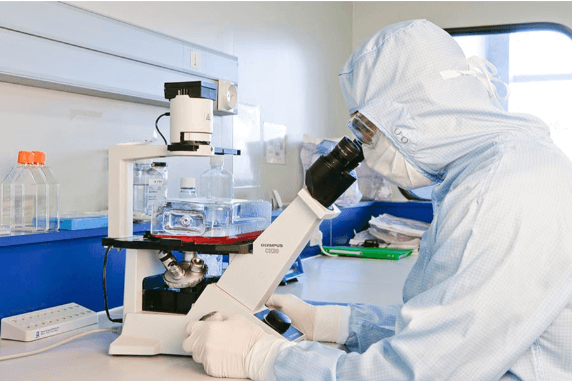Mésenchymateux Thérapie par cellules souches: A Promising Approach for Treating Wilson’maladie de S
Introduction
Wilson’s disease (WD) is a rare autosomal recessive disorder characterized by defective copper metabolism due to mutations in the ATP7B gene. This results in excessive copper accumulation in the liver, cerveau, et d'autres organes, leading to hepatic failure, neuropsychiatric symptoms, and systemic complications. Conventional treatments, including chelation therapy and zinc supplementation, help manage copper overload but do not address underlying liver damage or restore normal metabolic function. Récemment, cellule souche mésenchymateuse (MSC) therapy has emerged as a groundbreaking regenerative approach with the potential to repair damaged tissues, Restaurer la fonction hépatique, and improve clinical outcomes in WD patients.
Understanding Mesenchymal Stem Cells (MSC)
MSCs are multipotent progenitor cells capable of differentiating into various cell types, y compris les hépatocytes. They exhibit strong immunomodulatory, anti-inflammatoire, and regenerative properties, making them an ideal candidate for treating metabolic and neurodegenerative disorders. MSCs can be derived from multiple sources, y compris la moelle osseuse, tissu adipeux, cordon ombilical, and placenta, with minimal ethical concerns and a low risk of immune rejection.
Mechanisms of MSC Therapy in Wilson’s Disease
MSC therapy provides several therapeutic benefits for WD patients through multiple mechanisms:
- Liver Regeneration: MSCs can differentiate into hepatocyte-like cells and replace damaged liver tissue, enhancing hepatic function and reversing fibrosis.
- Effets anti-inflammatoires: MSCs secrete cytokines and growth factors that suppress inflammation and modulate immune responses, reducing liver injury.
- Copper Metabolism Regulation: MSC-derived hepatocytes can help normalize ATP7B function, improving copper excretion and preventing further accumulation.
- Neuroprotection: MSCs produce neurotrophic factors that support neural regeneration and protect against oxidative stress, alleviating neuropsychiatric symptoms in WD patients.
- Promotion de l'angiogenèse: MSCs stimulate new blood vessel formation, enhancing liver microcirculation and tissue repair.
Preclinical Studies on MSC Therapy for Wilson’s Disease
Animal models of WD have demonstrated the efficacy of MSC therapy in restoring liver function and reducing copper overload. Studies using MSC transplantation in WD mice have shown significant improvements in hepatic enzyme levels, reduced fibrosis, and enhanced survival rates. These findings confirm the potential of MSCs in correcting metabolic dysfunction and preventing disease progression.
Clinical Applications and Trials
Clinical trials investigating the use of MSC therapy in WD patients have reported promising results. Transplanted MSCs have successfully integrated into the liver, improved biochemical markers, and alleviated symptoms associated with WD. Patients receiving MSC therapy have experienced enhanced liver function, reduced neurological complications, et une amélioration globale de la qualité de vie. The long-term safety and efficacy of MSC therapy continue to be evaluated, but early findings indicate a favorable risk-benefit profile.
Advantages of MSC Therapy Over Traditional Treatments
- Restoration of Liver Function: Unlike chelation therapy, which only removes excess copper, MSC therapy actively repairs liver damage and enhances hepatic performance.
- Procédure mini-invasive: MSC therapy is administered through simple intravenous infusion, avoiding the need for major surgical interventions like liver transplantation.
- Avantages à long terme: Les CSM fournissent des effets régénératifs soutenus, reducing the need for lifelong medication and minimizing disease relapse.
- Compatibility and Low Immunogenicity: Autologous or allogeneic MSCs do not trigger immune rejection, making them a safer alternative to conventional therapies.
Directions et défis futurs
Despite its promising potential, MSC therapy for WD requires further investigation to optimize treatment protocols, dosage, and long-term outcomes. Future research should focus on:
- Enhancing MSC Differentiation Efficiency: Developing strategies to improve hepatocyte differentiation and functional integration into the liver.
- Combining MSC Therapy with Gene Editing: Using CRISPR/Cas9 to correct ATP7B mutations in patient-derived MSCs before transplantation.
- Large-Scale Clinical Trials: Conducting multi-center studies to validate efficacy and establish standardized treatment guidelines.
Conclusion
MSC therapy represents a revolutionary advancement in the treatment of Wilson’s disease, offering regenerative benefits beyond conventional therapies. By repairing liver damage, restoring metabolic function, and alleviating neuropsychiatric symptoms, MSCs provide a viable alternative to current treatment options. With continued research and clinical validation, MSC therapy has the potential to become a mainstream therapeutic strategy for Wilson’s disease, transforming patient outcomes and quality of life.

